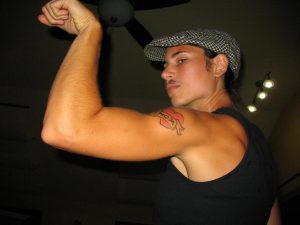This article, first published in Communities issue #162, is one example of how the FIC cares about educating the public on social justice issues and ending oppression. Kim Scheidt works part-time for the Foundation for Intentional Community in addition to her other jobs as homesteading feminist and half-time mom.
For more 30th blog posts click here.
 By default, intentional community in North America seems to be a haven for middle-class white folk interspersed with a small spattering of individuals of various other ethnic groups. The community where I live follows that same norm for the most part. It is an interesting mix, though, because we also serve as a tourist stop for quite a few visitors and interns from all over the world. I do lament the lack of racial diversity in my everyday life. However, I also try to teach by example—and by mini-lectures to the kids around here—that people are not to be judged based on outer appearances.
By default, intentional community in North America seems to be a haven for middle-class white folk interspersed with a small spattering of individuals of various other ethnic groups. The community where I live follows that same norm for the most part. It is an interesting mix, though, because we also serve as a tourist stop for quite a few visitors and interns from all over the world. I do lament the lack of racial diversity in my everyday life. However, I also try to teach by example—and by mini-lectures to the kids around here—that people are not to be judged based on outer appearances.
My lips still curve into a smile at the memory of what I consider an example of this teaching yielding quality results. A very dark-skinned man from Uganda visited the area for a handful of weeks. Upon meeting him for the first time, my then four-year-old daughter turned to me and said quietly, “Michael must have a lot of melanin in his skin.” Brilliant. It was a simple observation of the situation with no judgment whatsoever placed on something that is skin-deep.
Of course, race is not the only cultural divide within the larger population. Societal roles of men and women are a big deal almost everywhere. And I am not surprised that in the alternative culture of intentional community, gender seems to be a much more fluid state than in the mainstream—a multiple-choice question having more than just a few answers.

Societal norms around dress are not so prevalent here. Men regularly wear skirts and it is no big deal. I like that we have adapted our everyday language to account for such diversity by incorporating gender-neutral pronouns into our vocabulary. In introductory classes I’ve attended of activities ranging from acroyoga to co-counseling, instructors have begun by asking the group which pronouns each person prefers to go by. We aren’t so quick to assume that a person by definition is a “he” or a “she.”
A couple of years ago a new resident arrived in the area who identifies as transgendered. He threw a gender-bender dance party for his birthday…and since he and I happen to share a birthday, I got to go to a gender-bender dance party on MY birthday. That was awesome. Seeing so many of my community mates dressing with abandon contra to their typical gender style just warmed my heart. And I certainly loved sporting the sideburns and mustache I drew on myself with purple and gray eyeliner. (The black eyeliner was otherwise being used, and I’m not one to stand around waiting in line when there’s music to be danced to.)
- ● ●
I like to denounce societal brainwashing in general. The process of dismantling sexism is in particular a key issue for me. I support and encourage those around me to question assumptions about traditionally defined gender roles. However, I usually like to phrase it in positive language and say that I’m pro-feminist. The intentional community network to which I belong also touts feminism as a top value.

I recently corresponded with a person we’ll call John who wrote saying he is in 100 percent alignment with the core principles of my sub-community except possibly for “one which I may be a little fuzzy on the definition of—that would be feminism. What is your definition?”
Now up to that point I had never sat down to think about or put into written words my definition of feminism. My response to John was this:
“Hi John,
“I understand that feminism has different meanings for different people. For me it is mostly about ‘anti-sexism.’ I am interested in ending all oppression of all people for any and all reasons, though for me personally the key issue is sexism which includes both the oppression of women and the oppression of men based on gender. However, it is often women who bear the brunt of sexism (and I am a woman) so that is more my focus. Empowering women, and empowering men is good too.
“I am interested in people who like to look directly at the messages society has almost subconsciously placed in our heads about what females can and can’t do, for what they are valued or not valued, etc. Also questioning this for men I think is important.
“A brief story I read a couple months ago hit home for me as a good analogy. The author was at the beach and saw a man playing in the ocean waves with two young children about the same size, one boy, one girl, one on each arm. When the big waves came he would brace the boy with his arm (subtly) teaching him to meet the power of the waves head on, that he was strong and capable and needed to face fears and the challenges of life. At the same time, when the waves came, with his other arm he would lift the girl child out of the water up in the air (subtly) teaching her that #1 she is to be treated differently than the boy, #2 she is not strong enough or capable enough to handle the challenges of life, and #3 she needs to rely on a man to ‘save’ her.
“Even around these communities, supposedly pro-feminist, where I live, there are many times I have experienced hearing a woman voice a particular idea to an individual or group and no one really listens, then a couple minutes (or even seconds) later a man says exactly the same thing and everyone listens, oohs and aahs about this important or brilliant or whatever thing he just said.”
My email response went on to rant about further topics not entirely unrelated, but I think you get the gist of it. I’m desirous of equal treatment, equal value placed on the inherent intelligence of us all.
- ● ●
This past summer I hosted a lovely couple as visitors who were entirely new to the communities scene. On the fourth day of their visit, the woman confided to me that when she originally read the blurb I had written on the ic.org directory website citing feminism as a top value of my sub-community, she had been curious what that would look like actually put into practice. She told me she’d had some qualms that I would be overzealous or preachy about women’s equality. And what she said to me was that instead she saw that I was acting as an empowered woman. Simply by living my life I am setting an example of what feminism can be, and witnessing it encourages others to act in a similar vein.
Perhaps this role of EMPOWERED WOMAN was forced upon me a little abruptly—to take on certain responsibilities myself when the default typically would have been to outsource them to a male. But I’ve gathered up the strength to learn new skills and I’m doing it, as well as asking for help and advice from others when I want it. My life is a demonstration project, and I care about empowering others to shrug off the limits we place on ourselves and one another around gender roles and all other typology boxes. I’d like for us to bite our thumbs at society status quo—to blaze new territory where value is placed on individuals simply for being, and where assumptions are never made about a person based on appearances, sexual orientation, or gender.











